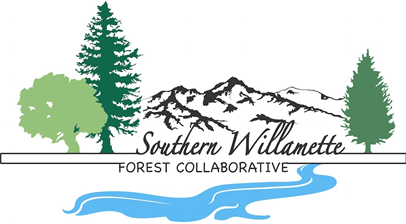Guest post by Sarah Altemus-Pope, SWFC Coordinator
On April 10th, 2019, Rural Voices for Conservation Coalition (RVCC) hosted a peer assist for the Southern Willamette Forest Collaborative (SWFC) to visit Wallowa Resources (WR) in Enterprise, OR. Four steering committee members and two staff spent the day learning about the WR organizational model and visit Integrated Biomass Resources (IBR).
The SWFC is a forest collaborative based in Oakridge, OR that works in the upper Middle Fork Willamette watershed. Since 2015, the SWFC has worked to bring together diverse stakeholder groups, such as environmental organizations, industry representatives, local government, state and federal land management agencies, and community members to find agreement on forest management. This collaboration has led to the development of new projects that meet multiple ecological and economic objectives and offer opportunities to create solutions to current challenges facing rural communities.
The SWFC is exploring an opportunity to form a 501c3 and expand its existing Community Firewood Program (CFP) to include a commercial firewood operation. In 2018, the SWFC, Oregon Department of Forestry, Lane County, City of Oakridge, Inbound LLC, and the Willamette National Forest pooled resources to analyze a phased biomass plant for Oakridge to utilize timber harvest byproducts. With a steady supply of timber harvest byproducts and secure markets, Oakridge would be an ideal location for a commercial firewood operation and eventually a small multi-product plant.
The visit to Wallowa Resources and IBR was an excellent learning opportunity to explore the opportunities for scaling up both the SWFC organization and CFP project.
Three lessons that participants took away from the WR visit are:
Organizational risk-taking can be necessary for growth
Forging new partnerships and thinking outside the box can bring new opportunities
Diversification can help to sustain a small community based organization
First, organizational risk-taking can be necessary for growth. Wallowa Resources is now a much larger organization than the SWFC, yet it was helpful to learn about how it has grown over the last 20 years.. The SWFC has very similar organizational interests and origination story. It was inspiring to learn how WR started as a small community based organization and grew as needs were identified and opportunities arose. Taking on new projects, such as developing field programs, acquiring a community center, and manufacturing wood biomass products are fairly high risk endeavors with small financial margins. Yet, taking risks can be worth the return on investment in order to create local jobs and provide services that would otherwise not exist in a rural area.
Second, people and partnerships matter. We learned about how the Wallowa Whitman and Umatilla collaboratives are working to recruit new members and working creatively with partners to forge agreements and get work done. It was useful to discuss challenges of organizational turnover and maintaining partner engagement. As with the SWFC, key people and partnerships can make a difference, and losing a strong leader within the collaborative or Forest Service can leave a big gap. New members need to be recruited and cultivated and on-boarding processes are important. We also shared an ‘ah-ha’ moment discussing ideas to engage Tribal partners – both by reaching out to Tribes post-agreement to share information and by getting feedback and/or looking for funding for limited capacity stakeholders in order to remove barriers to participation.
Third, diversification can help to sustain a small community-based organization. As a small nonprofit, the SWFC recognizes that rural community-based organizations have to meet many needs with limited resources. It was interesting to learn about the diversity of programs that exist within the larger umbrella of WR. The natural resource based startup culture of the organization is a practical way to cultivate new initiatives. An added benefit of organizational diversity is the pooling of resources, including people, under one organization. Cross pollination of multiple mission sets can create opportunities that might not otherwise arise.
Last, the visit to IBR was informative. The SWFC participants were interested to learn about WR’s joint endeavor with IBR. IBR has filled a niche that we believe exists in our community as well – utilizing non-commercial saw logs and converting them to the highest merchantable product: post and pole, bundled firewood, and clean wood chips for pulp mills. IBR in its current form started as post and pole operation that added commercial firewood. The lesson of multiple product lines is that it’s important to maximize the value of forest byproducts but it is possible to start small. We also talked about challenges of securing source stock. IBR overcame its challenge of source stock by diversifying – expanding beyond private lands to purchasing an interest in public sales. As the company grew, and could manage all sizes of wood, supply became less of an issue. Now IBR is able to buy timber and stewardship sales and manage the harvest and merchandising directly.
On site innovations, such as the biomass boiler system are also components that the SWFC is exploring and it was helpful to see the integrated production flow of the IBR mill. It was also apparent that having the right personnel is important for success, and the WR/IBR partnership brings together complementary strengths and the business is able to benefit from the work of other WR initiatives.
Overall, the SWFC participants felt that the peer assist was a beneficial experience and gave us plenty to consider and model as we grow our program. On behalf of the SWFC steering committee and members, we would like to thank Wallowa Resources and Rural Voices for Conservation Coalition for making this trip possible and taking the time to host.
To contact Sarah Altemus-Pope, SWFC Coordinator, email director@swfcollaborative.org or visit them online at: southwillamette.wixsite.com/swfc
SWFC Steering Committee
David Chamberlain Greater Oakridge Area Trail Stewards
Sarah Dyrdahl Middle Fork Willamette Watershed Council
Paula Hebert Oregon Horseman’s Association
Loren Hogue Community member
Kathy Holston Oakridge Mayor
Thalia Lerin Westfir City Council
Rob Mickey Middle Fork Ranger District (Advisory)
Susan Obermeyer Community member
Laurie Patty Oakridge business owner




